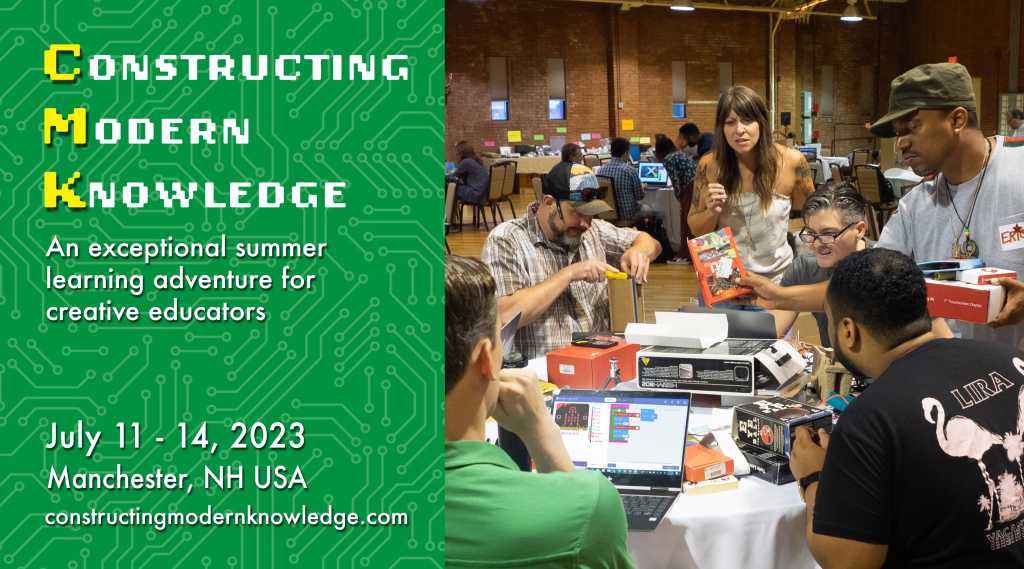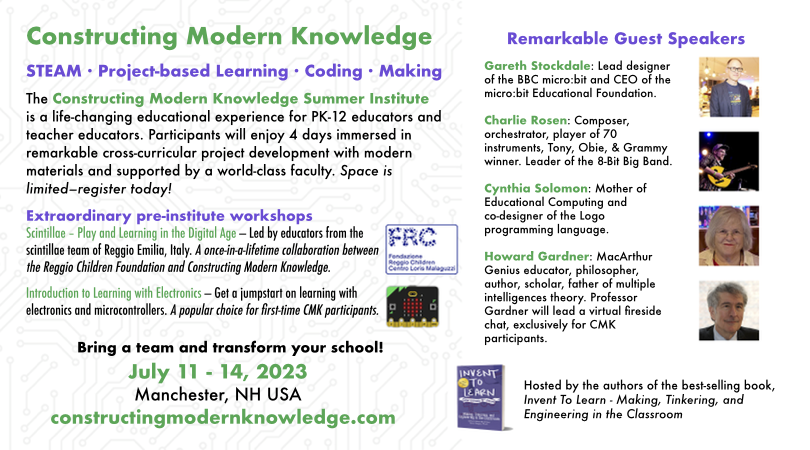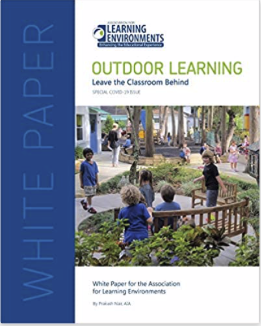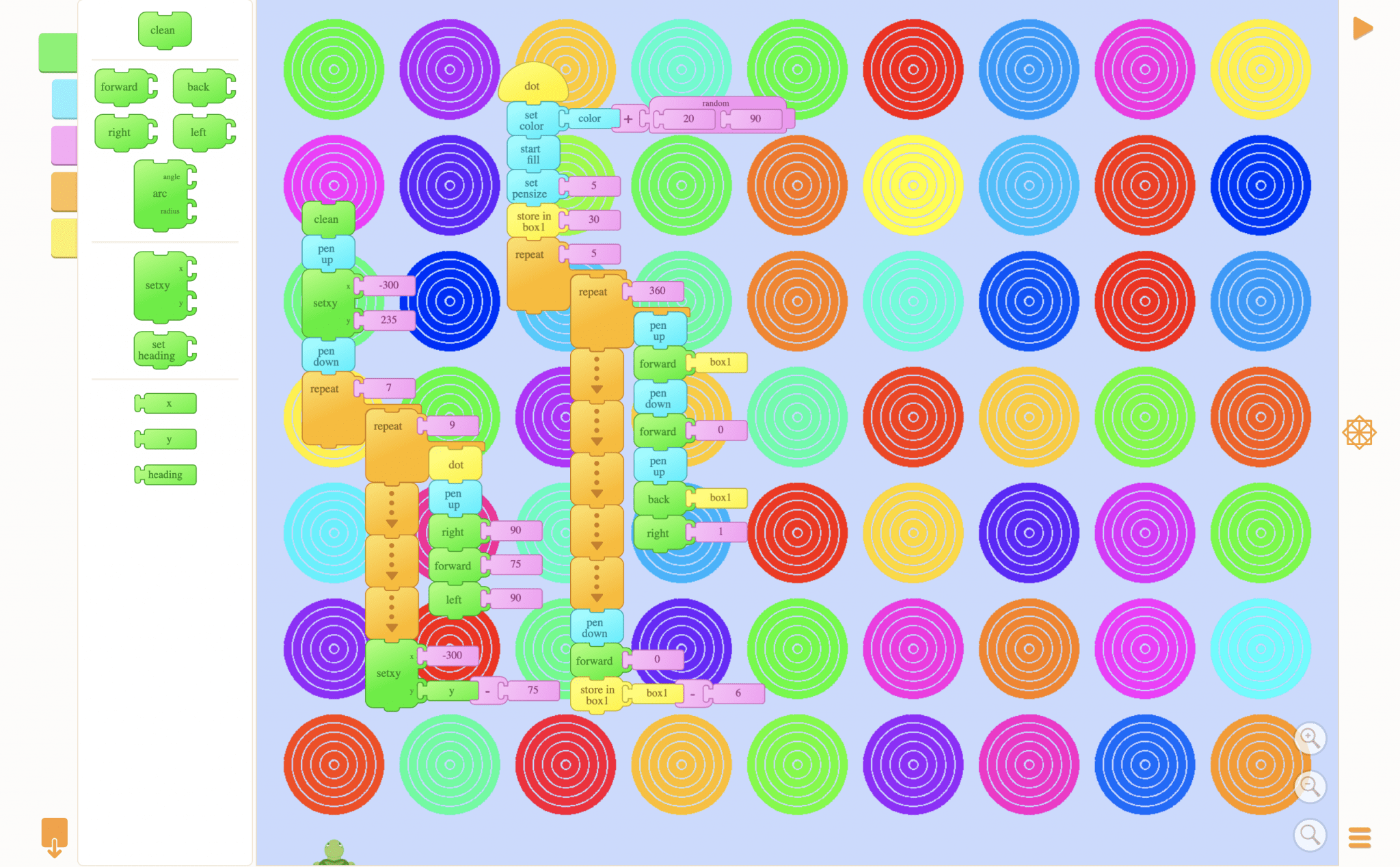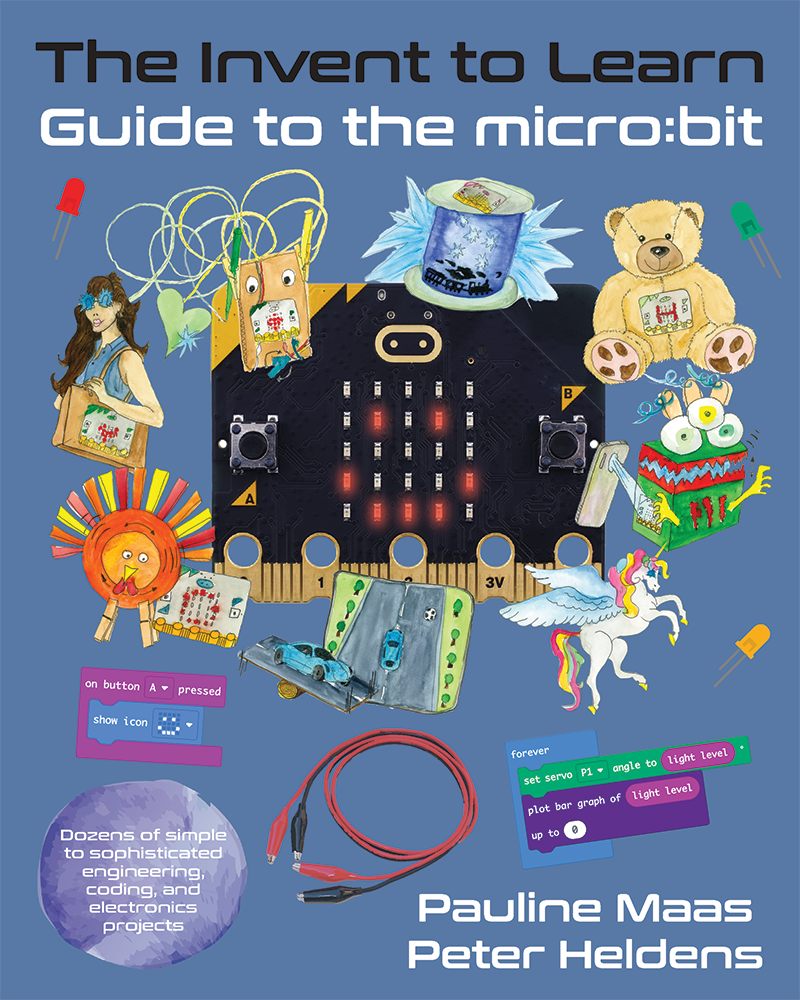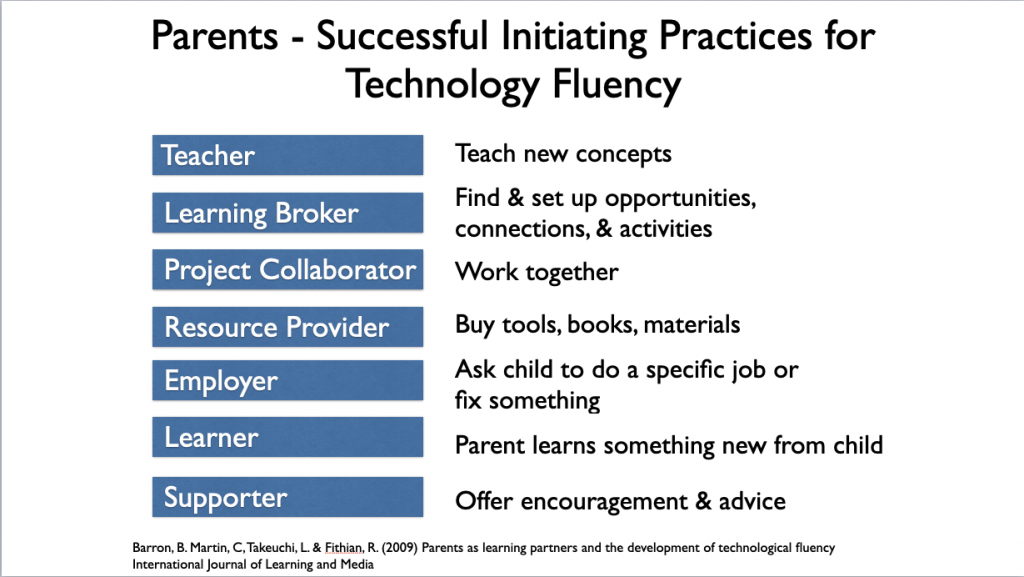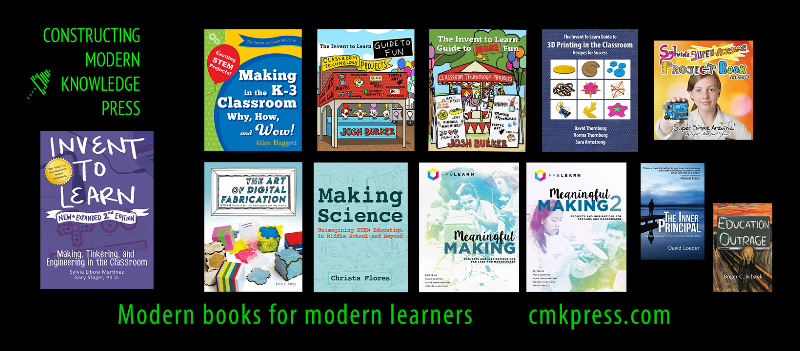The Case Against Innovation Resources
Gary Stager’s recent books
- Invent To Learn – Making, Tinkering, and Engineering in the Classroom
- Twenty Things to Do with a Computer Forward 50: Future Visions of Education Inspired by Seymour Papert and Cynthia Solomon’s Seminal Work
- The Invent to Learn Guide to the micro:bit
Constructing Modern Knowledge 2023 summer institute information
Suggested reading for effective school leaders
Three Steps to Project-Based Learning
Clever Computing for Children (online course for students with teacher mentoring)
Stephen Wolfram on ChatGPT and Computational Thinking
Will AIs Take All Our Jobs and End Human History—or Not? Well, It’s Complicated…
What Is ChatGPT Doing … and Why Does It Work?
Wolfram|Alpha as the Way to Bring Computational Knowledge Superpowers to ChatGPT
New Computing Challenges
Pandemic-era Writing
- This is Our Moment!
- Revisiting Learning Adventures in the Time of COVID-19
- The Hang – The importance of unstructured conversation.
- Flip the Script – “So, here is my advice for the teachers expert in learning-by-doing. Stand your ground. Fight for your programs. Defend your turf – literally and figuratively. Make it abundantly clear that when face-to-face school resumes, you’re not going anywhere.”
- THIS is Why Schools Exist
- Planning for the Best-Case Scenario
- Books & Stuff that Soothe and Inspire Wonder – Nourish your teacher soul.
- Educational Zoom Activity #1 – sharing the process of decision making.
- Let COVID-19 Kill the Pencil
- Big Ideas – A challenge for educators. Which educational practices can you imagine abolishing in schools? I am sure you can think of ineffective, grossly expensive, distracting, or miseducative “traditions” most people take for granted.
- If You Must Lecture, Here’s the Definitive How-To
Teaching Online
- Learning Adventures: A new approach for transforming real and virtual classroom environments – academic paper by Gary Stager
- Towards a Pedagogy of Online Constructionist Learning– academic paper by Gary Stager
- Online Constructionism and the Future of Teacher Education – academic paper by Gary Stager and Terrence Cannings
- Online Communities as a Vehicle for Developing Secondary Mathematics Educators – academic paper by Gary Stager and Terrence Cannings
- Lessons in Learning, e-Learning, and Training: Perspectives and Guidance for the Enlightened Trainer – book by Roger Schank
- Designing World-Class E-Learning: How IBM, GE, Harvard Business School and Columbia University Are Succeeding at E-Learning – book by Roger Schank
New – The Constructing Modern Knowledge Podcast
Live @ Constructing Modern Knowledge – Interviews, keynotes, and more from Gary Stager.
Projects & Citizen Science
- Project Collections & Inspiration – Online project libraries and collections, tutorials, good starter projects, and more.
- Good books for project ideas or to suggest to parents.
- Inventors, Inventing, & Citizen Science – global projects you can join
- Birdwatching Citizen Science projects from Cornell – join others in tracking and celebrating birds in your community.
- Let Grow – Let Grow school programs make students more capable, confident, and resilient
- Bard College Citizen Science – Bard College requires all freshmen participate in a 2 week session to develop science literacy skills. Every year a new project is chosen that all students participate in. Curriculum and readings are shared online.
- MIT Full STEAM Ahead – Curated collections of K-12 STEAM project resources.
Media used in some of our workshops
Frank Gehry Masterclass
- Video of entire Frank Gehry YoungArts Masterclass episode
- Other YoungArts Masterclass on HBO episodes
- DVD of 9 YoungArts Masterclass episodes (including Frank Gehry)
The 3N problem online
- The 3N problem – Explanation and online virtual assistant.
- The 3N problem wikipedia entry
Teaching using projects
Creating effective project prompts
- Three articles by Gary Stager about effective project-based learning from The Creative Educator (PDF)
- The Subtlety of Prompt Setting
The Project Approach
- The Project Approach website http://projectapproach.org
- Summary of The Project Approach (and what’s wrong with KWL) https://sylviamartinez.com/project-based-learning-framework/
- Three phase project process – Downloadable framework
Books on The Project Approach
- Engaging Children’s Minds: The Project Approach – By Lillian Katz and Sylvia Chard
- Young Investigators: The Project Approach in the Early Years – By Judy Harris Helm and Lillian G. Katz.
- The Project Approach: Managing Successful Projects (Book 2) – By Sylvia Chard
Making Learning Whole
Making Learning Whole: How Seven Principles of Teaching Can Transform Education – David Perkins outlines seven practical strategies that educators can use to create more authentic learning experiences.
Centers & Choice Time
- Choice Time – a book review by Gary Stager of Renee Dinnerstein’s book, Choice Time
- Investigating Choice Time: Inquiry, Exploration, and Play Blog by: Renée Dinnerstein
- Thoughts on Classroom Centers – One of the best progressive classroom practices is often misunderstood. By Gary Stager.
Outdoor Learning: Leave the Classroom Behind
Gary Stager recently contributed to a new publication by arguably the world’s best school architect and learning space designer, Prakash Nair.
With COVID-19 seemingly here to stay, there is now a serious move to take learning outside to maximize school capacity. Social distancing is easier outside than within the confines of a classroom. It is likely that outdoor learning, until very recently a novelty, will soon become quite widespread. This white paper is the most comprehensive treatise on the subject of Outdoor Learning presented from the perspective of educators, architects, neurologists and environmental scientists.
More about progressive education
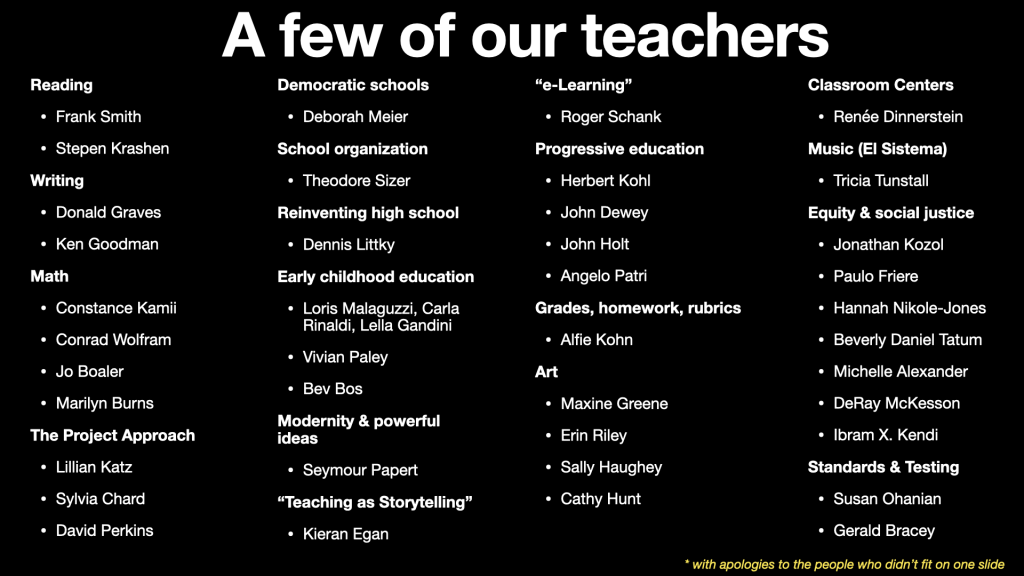
- Open Education resources (a curated collection of remarkable video and classic texts)
- A Good Beginner’s Library to Progressive Education with Books for K-12 Educators
- A Progressive Education Reader – a downloadable PDF of collected works about progressive education.
- Seymour Papert & Constructionism
- Technology is Not Neutral – Constructionism vs. instructionism
- Books and papers by Seymour Papert, resources on constructionism
- The Eight Big Ideas of the Constructionist Learning Lab (PDF) – The father of constructionism explains what it looks like in this guide for laypeople.
- Reggio Emilia Approach
- Reggio Children – The international resource for educators interested in the Reggio Emilia approach.
- Reggio Children Foundation COVID Learn at Home activities and resources (English)
- Reggio Children Books & DVDs – Official distributor of Reggio Children’s resources.
- The Hundred Languages of Children – The definitive book on the Reggio Emilia Approach edited by Carolyn Edwards, Lella Gandini, and George Forman.
- In the Spirit of the Studio: Learning from the Atelier of Reggio Emilia – Wisdom and practical ideas applicable to any makerspace or classroom by Lella Gandini and Lynn Hill.
- Beautiful Stuff : Learning with Found Materials – A book on organizing, teaching, and creating with found materials by Cathy Wiseman Topal and Lella Gandini.
- Alfie Kohn
- What to Look for in a Classroom by Alfie Kohn
- The Trouble with Rubrics by Alfie Kohn
- Deborah Meier & Ted Sizer
- Five Habits of Mind
- Common principles of the Coalition of Essential Schools
- Benchmarks from the Coalition of Essential Schools – more detailed classroom and school organizing practices.
Constance Kamii Math Resources
Constance Kamii math videos (multiple videos)
Constance Kamii Direct vs Indirect Ways of Teaching Number Concepts at Ages 4-6
A comprehensive lecture explaining Piagetian ideas showing that although number concepts cannot be taught directly, they can be taught indirectly by encouraging children to think.
Kamii Games for Developing Number Sense
- Arithmetic Games with Playing Cards
- Modifying a Board Game (Sorry) to Foster Kindergartners’ Logico-Mathematical Thinking
- Lining-Up the 5s – A Card Game
- Kamii Game Cards to download and print
- Kamii on Games over Worksheets (2000 article)
- Arithmetic for First Graders Lacking Number Concepts (2008 article)
- An important paper by Constance Kamii – Selected Standards from the Common Core State Standards for Mathematics, Grades K-3: My Reasons for Not Supporting Them
- Books by Constance Kamii
Teaching Programming
Articles about Teaching Programming
- What’s Your Hurry?
- A Modest Proposal (using Scratch books as reading texts)
- Masterclass archived video – Gary Stager’s approach to teaching programming
- Video – Summer Camp Computing or, Nostalgia for the Future
- Gary Stager’s 2021-22 Computational Teaching materials
Books and magazines for programming project ideas
- Recommended resources for many programming languages and books on the Invent to Learn site.
- Hello World – A magazine for teachers and kids about making and computing. Free to download, also free by mail to UK educators.
- HackSpace Magazine – Although published in partnership with the Raspberry Pi Foundation, this magazine offers open source projects for a wide variety of physical computing and fabrication projects. All issues can be downloaded for free.
Basic Computer Games books (pdf form) – great ideas for beginner programming projects.
- Basic Computer Games (first edition 1973)
- More Basic Computer Games (1980)
Roundup of Programming Environments, Computer Science, and Physical Computing
What’s New: New micro:bit! TurtleArt on the Web! MakeCode updates! microBlocks is ready for its close-up! Exciting Snap! news!… Click here for a round-up the latest news, opportunities, and learning environments for you and your students.
Turtle Art materials
- Get Turtle Art (app)
- Browser-based TurtleArt
- TurtleArt for the iPad
- Gary Stager’s Early Turtle Art activities
- Turtle Art Activity Cards
micro:bit
- Curated collection of micro:bit resources
- The Invent to Learn Guide to the micro:bit
- Four Take Home Makerspaces for Under $100
- New micro:bit v2 released November 2020. Same price, more features including speaker and microphone.
Logo activities
These activities designed for MicroWorlds EX should be applicable to other programming environments, like Turtle Art, Scratch, Snap!, and especially Lynx. If you translate any of these activities for other languages, please let me know!
- Old-fashioned Quilt Making in an Online Collaborative Setting – Use MicroWorlds EX in this simple open-ended creativity project. (2007)
- Making Aboriginal Dreamtime Designs with MicroWorlds – An interdisciplinary project (2000)
- Gary’s Fraction Software Activity
- 21st Century Logo Quilts – A Twist on a Classic Geometry/Art Activity (1999)
- Build Your Own Virtual Pet with MicroWorlds
Make Your Own Tamagotchi ©1998-99 Adam Smith with a bit of help from Gary Stager - Turning Math Manipulatives Inside Out (1998)
- MicroWorlds Claymation – Create your own Wallace and Gromit with one line of code! (2000)
Snap!
- Snap! – Run Snap! and reference manuals
- Graphing Linear Equations in Snap!
Block-based programming research
- Blocks or Text? How Programming Language Modality Makes a Difference in Assessing Underrepresented Populations by David Weintrop, Heather Killen, and Baker Franke
- Programming in blocks lets far more people code — but not like software engineers: Response to the Ofsted Report by Mark Guzdial
- How Block-based Languages Support Novices:A Framework for Categorizing Block-based Affordances by David Weintrop and Uri Wilensky
Wolfram Resources
Resources related to Conrad and Stephen Wolfram’s work on math, computation, and programming
Programming Slides
Inspiration Online
- 8-Bit Big Band
Online Choir
Inclusion, Equity, and Diversity
- DIYAbility – “Where MacGyver meets Assistive Technology” Projects, workshops and resources on making and hacking for children with disabilities.
- Making and ELL – Encouraging Conversational Confidence
- Girls in Tech – By Sylvia Martinez for Intel Australia. A free guide about how maker education can support equity for girls in STEM.
- Tinkering Spaces: How Equity Means More Than Access – Interviews with several educators working to provide equitable access to makerspaces to youth.
- Making Culture – An examination of K-12 education makerspaces nationwide from the ExCITe Center’s Learning Innovation initiative at Drexel School of Education. The report reveals the significance of cultural aspects of making (student interests, real world relevance, and community collaboration) that enable learning. The research highlights how makerspaces foster a range of positive student learning outcomes, but also reflects some of the gaps in inclusion common in STEM courses and careers.
- Recontextualizing the Makerspace: Culturally Responsive Education – Nettrice Gaskins argues for a redefinition of technology and technological processes that include engagements by groups underrepresented in the DIY/makerspace/hacker culture movement.
- On Equity Issues in the Maker Movement, and Implications for Making and Learning – Rafi Santo addresses the serious equity issues found in the maker movement and provides links to many organizations working to provide more equitable making experiences.
Girls and STEM
Parents & Families
- STEMx Parent’s Guide to STEM and school closure resources
- Good books for project ideas to suggest to parents.
- The Why Sheets – Inspired by an article by Alfie Kohn, these are one page handouts for parents and the community explaining why a school has chosen a particular educational practice, for example, no homework, no grades, or a project-based approach. The power is in coming to consensus about these important issues. (Examples from The Human Restoration Project) (More examples from the International School of Uganda)
- (Download Slide from workshop) How parents can support their children in technology and project-based learning
About Gary & Sylvia
Veteran educator Gary Stager, Ph.D. is co-author of Invent To Learn — Making, Tinkering, and Engineering in the Classroom, publisher at Constructing Modern Knowledge Press, and the founder of the Constructing Modern Knowledge summer institute. He led professional development in the world’s first 1:1 laptop schools thirty years ago and designed one of the oldest online graduate school programs. Gary began defending school music programs from the wrecking ball in 1982. Learn more about Gary or contact him here.
- Dr. Stager’s web site
- Video library (including four TEDx talks)
- Publications by Gary Stager
- Reviews of Dr. Stager’s work
- Gary Stager’s blog
- The Daily Papert
Sylvia Martinez is the co-author of Invent to Learn: Making, Tinkering, and Engineering the Classroom, known around the world as the “bible of the classroom maker movement.” She advocates for student-centered hands-on, minds-on learning with an emphasis on STEAM for all. She is president of CMK Futures, creating books and professional development to help educators invent the future of learning.
Sylvia is also principal advisor to the Columbia University FabLearn Fellows, a research group of global educators sharing hands-on, minds-on projects and curriculum. She also led educational non-profits and headed product development for consumer software, video games, and educational games at several software publishing companies.
Martinez started her career as an electrical engineer designing high frequency receiver systems and software for the GPS navigational satellite system. She holds a masters in educational technology and a bachelors in electrical engineering.
